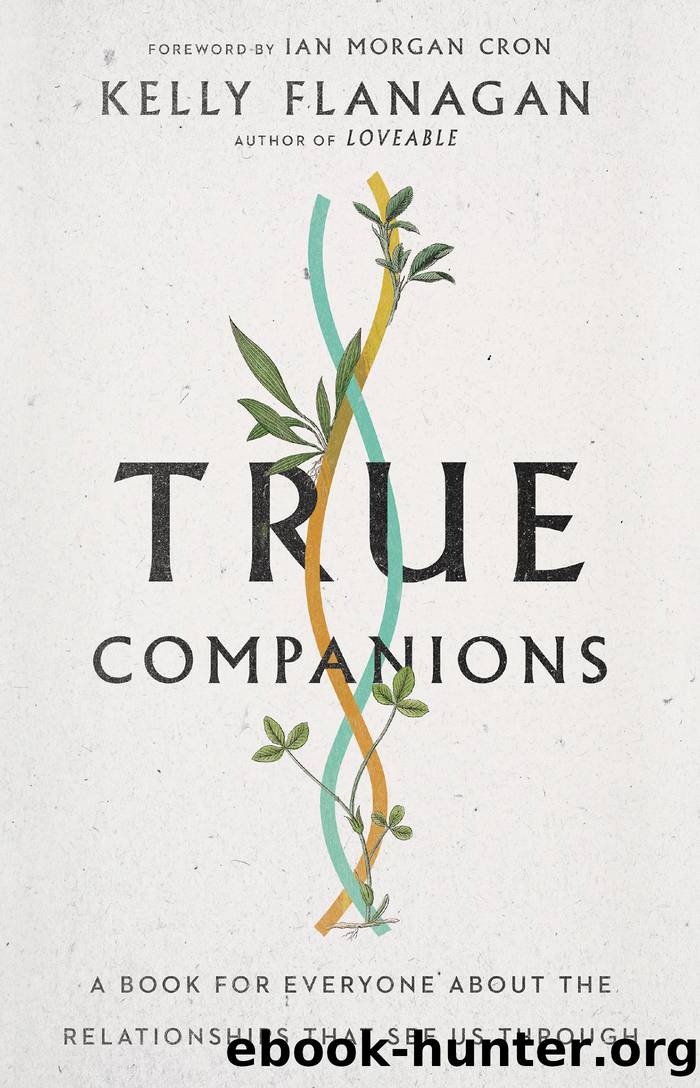True Companions by Kelly Flanagan

Author:Kelly Flanagan
Language: eng
Format: epub
Tags: Marriage;Christian marriage;life long marriage;relationship;long lasting marriage;marriage for the long haul;Christian relationship;friendship;Christian friendship;intimate friendship;intimacy;dating;communication;Christian love;companionship;companion;life long companion;loneliness;divorce recovery;enneagram;life long friendship;friend
Publisher: InterVarsity Press
Published: 2020-12-07T10:49:14+00:00
14
COMPETITION
A flower does not think of competing with
the lower next to it. It just blooms.
ZEN SHIN
ANOTHER SUMMER, ANOTHER WEEK at the beach. Itâs one of our most treasured family traditions, and within the big tradition are many smaller ones: morning bike rides, afternoon jigsaw puzzles, evening dance parties, and perhaps most cherished of all, lunch on the beach. Around noontime, while the kids play in the waves, I head to the boardwalk for a bucket of french fries the size of a small trash can, sizzling hot, drenched in vinegar, sprinkled with salt. When I return, the kids are asked to approach the beach blanket carefully, so as not to kick sand into the fries. Two of our children almost always comply. The middle one, though, is a little too much like me. Heâs competitive.
For Quinn, this isnât a leisurely lunchtime moment. This is a moment in which he might be left with fewer french fries than his brother or sister. To him, itâs a competition for resources, so he likes to take the quickest route to them. One day, he runs right across the blanket, accidentally kicking sand into the bucket of fries. When it comes to food, a little sand goes a long way. In his race to win more french fries, he has ruined them.
Competition works the same way in companionship, ruining it, making it inedible, unlivable. Competition and connectionâlike anger and fearâare mutually exclusive intentions. You canât be competitive and connective in the same moment. This truth isnât always obvious. For instance, when Quinnâs soccer team is playing a game, they will quickly take a knee when a player on the other team gets injured, a generous show of compassion. However, in the moment they take the knee, they quit competing. When play resumes, if they remain compassionate, they will be uncompetitive. Similarly, men often believe they are connecting in the midst of competitionâathletics and card games come to mindâbut the truth is they donât connect during the competition; they connect about the competition. They compete, then laugh about it, then go back to competing. This is why women are more likely to choose book clubs over poker nights. Theyâre choosing connection over competition.
Some of the highest achieving people I know are disturbed by this idea. They want deeply to be more connected to their companions and their colleagues, but they worry that doing so will rob them of their competitive edge. They fear connection will cost them production. Iâm always happy to reassure them that, as competition gives way to connection in their life, they will not achieve less; in fact, they will probably achieve more. When we trade dominance for excellence, we also receive balance and peacefulness and sustainability. We can usually produce more in the midst of harmony than chaos and achieve more with the glad support of our companions than with their resentful resistance. Unlike dominance, excellence has space for connection and compassion within it.
Having said that, competition is a particularly effective protection, so it can be particularly difficult to leave behind.
Download
This site does not store any files on its server. We only index and link to content provided by other sites. Please contact the content providers to delete copyright contents if any and email us, we'll remove relevant links or contents immediately.
The 5 Love Languages: The Secret to Love That Lasts by Gary Chapman(9777)
The Space Between by Michelle L. Teichman(6924)
Assassin’s Fate by Robin Hobb(6193)
Wiseguy by Nicholas Pileggi(5765)
Everything Happens for a Reason by Kate Bowler(4729)
Gerald's Game by Stephen King(4636)
Pillow Thoughts by Courtney Peppernell(4271)
A Simplified Life by Emily Ley(4156)
The Power of Positive Thinking by Norman Vincent Peale(4053)
Harry Potter and the Prisoner of Azkaban (Book 3) by J. K. Rowling(3346)
Resisting Happiness by Matthew Kelly(3335)
Girl, Wash Your Face by Rachel Hollis(3275)
Being Aware of Being Aware by Rupert Spira(3271)
The Code Book by Simon Singh(3172)
The Secret Power of Speaking God's Word by Joyce Meyer(3161)
More Language of Letting Go: 366 New Daily Meditations by Melody Beattie(3017)
Real Sex by Lauren F. Winner(3005)
Name Book, The: Over 10,000 Names--Their Meanings, Origins, and Spiritual Significance by Astoria Dorothy(2969)
The Holy Spirit by Billy Graham(2938)
